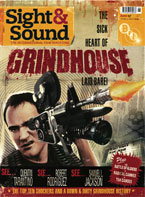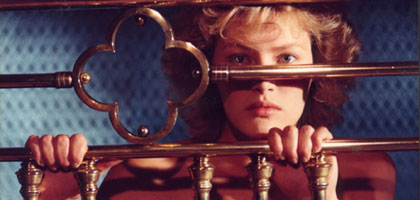
NOZONE: Caught in a trope
DVD review: La Belle Captive

Alain Robbe-Grillet's films are more read about than seen. Tim Lucas hopes a new DVD release will change all that
Alain Robbe-Grillet; France 1983; Koch Lorber Films/Region 0; Aspect Ratio 1.66; 85 minutes; Features: trailer
Alain Robbe-Grillet, the celebrated founder of the nouveau roman objectivist literary movement of the 1950s and one of the most original novelists of the 20th century, made the lateral move to screenwriting with Alain Resnais' Last Year in Marienbad (L'année dernière à Marienbad) in 1961. Scoring, against all odds, an Academy Award nomination for best screenplay, Robbe-Grillet was encouraged to continue writing for the screen, and since - in his view - Resnais had taken home awards for simply following the directions given in his script, he attached himself to each new project as director. Since his debut with the remarkable L'Immortelle (1963), Robbe-Grillet has made another dozen films, all but one or two of them more commonly read about than seen, certainly in English. Robbe-Grillet is said to be rigorously protective of his films - despite their exploitable elements of sex, mystery, fetishism and even supernatural horror - not wishing them to become associated with the similar though less cerebral works of fellow oneirics and eroticists like Jean Rollin and Jess Franco; consequently, they have had virtually no authorised presence on home video apart from an academically issued limited edition of SECAM tapes in the 1980s.
Koch Lorber's new region-free DVD of La Belle Captive changes all that, in ways one hopes will extend to other Robbe-Grillet films. La Belle Captive was not especially successful in France, but it was one of his most popular films abroad; it shares its title and intent with his 1975 experimental novel, co-credited to surrealist painter René Magritte, which reworked texts originally written for two earlier novels, Topologie d'une cité fantôme and Souvenirs du triangle d'or, into a new narrative, illustrated by 77 Magritte paintings reproduced in black and white. Whereas the book could be read as a dialogue between Magritte's surrealist canvases and the author's imagination, the film tells a different story, in which Magritte's paintings also figure, though not exclusively: Goethe's telling of the Greek legend of the Bride of Corinth and Manet's The Execution of Maximilian also intrude into its dream weaving, as does Jean Cocteau's depiction of the Angel of Death as a motorcyclist in Orphée, an earlier work of cinematographer Henri Alekan.
As two-dimensional as any Magritte painting, the film attends to the consequences of a chance meeting between detective Walter Naim (Daniel Mesguich) and the mysterious Marie-Ange van de Reeves (Gabrielle Lazure), who later reappears as an unconscious and bloodied figure lying in the middle of a road, her hands bound in golden chains. He drives her to the nearest house to arrange for a doctor, only to find the villa inhabited by predacious men in tuxedos, undisguisedly aroused by the woman's bound and barefoot condition. They are given a room together and, during the night, Marie-Ange vacillates in Walter's perceptions between being beaten and handcuffed, and naked and vampiric. The next morning, he finds the woman gone and the villa in ruins, unoccupied for many years. Walter's principal assignment, meted out to him by his boss Sara Zeitgeist (Cyrielle Claire), is to deliver a letter to Count Henri de Corinthe (a Robbe-Grillet lookalike), who is found dead with a throat wound and formerly engaged to Marie-Ange to boot - that is, until her mysterious death six or seven years earlier. After this, the film takes a turn for the strange, but the narrative trappings will be wearily familiar to any Robbe-Grillet reader; it is, in fact, itself a beautiful captive, trapped by its own tropes, hoist on its own petroglyphs. In other words, as is often said of impenetrable art, it is what it is.
The man has no more devout English-speaking admirer than this writer, but La Belle Captive smacks of Robbe-Grillet lite. Its lead actors fail to fascinate and it lacks the hypnotic allure that distinguished Marienbad and L'Immortelle. It might have been more involving, one imagines, had its allusions been subtitled, rather than its narcissistic dialogue and narration. More positively, it shares the self-reflexive sense of humour of Robbe-Grillet's Trans-Europ Express (when he visits Marie-Ange's room, Walter finds a copy of the Robbe-Grillet/Magritte book stashed away), and several of Alekan's images are appropriately captivating.
